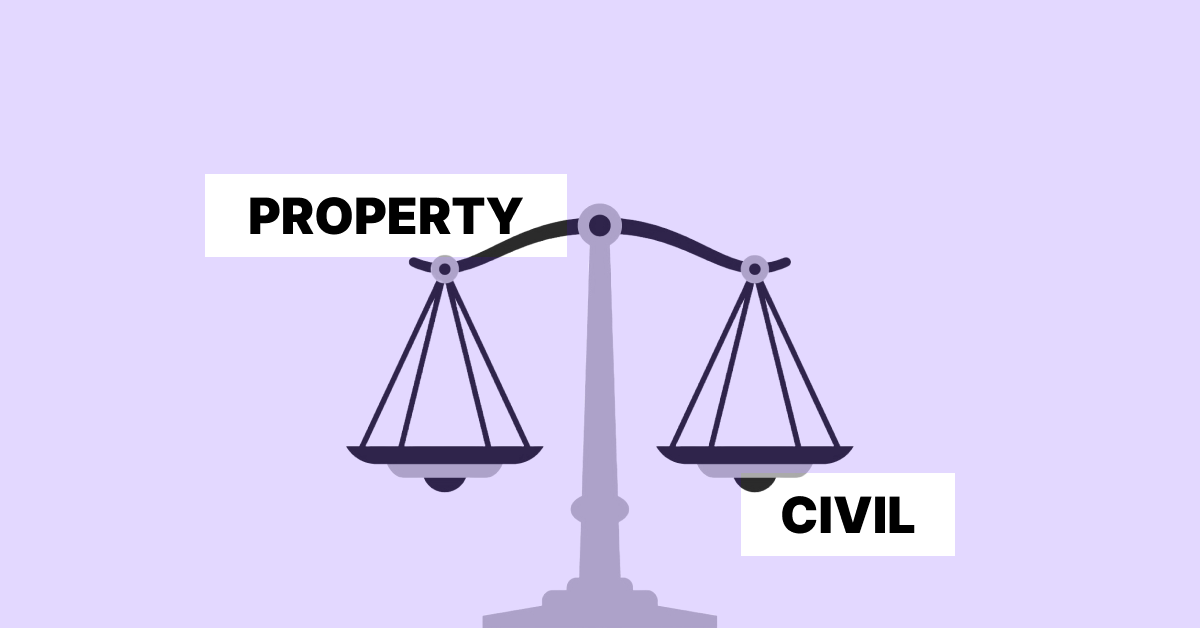Introduction
When dealing with property-related legal matters, it’s crucial to understand property law vs civil law in detail. This blog will delve into the specifics of each, helping you identify which legal services to seek for various property issues.
What is Property Law?
Property law is a branch of civil law that deals specifically with issues related to property ownership, transfer, and disputes. It includes:
- Ownership and Title: Determining legal ownership and resolving title disputes.
- Transfer of Property: Legal processes for transferring property ownership, including sales, gifts, and inheritance.
- Leases and Tenancies: Rights and obligations of landlords and tenants, including lease agreements and eviction processes.
- Easements and Covenants: Rights to use another person’s land for a specific purpose (easements) and restrictions on land use (covenants).
- Mortgages and Foreclosures: Legal aspects of securing loans with property and the process of foreclosure if the borrower defaults.
- Zoning and Land Use: Regulations governing how land can be used, including zoning laws and land development.
- Adverse Possession: Legal doctrine allowing a person to claim ownership of land under certain conditions if they have occupied it for a specific period.
What is Civil Law?
Civil law encompasses a broader range of legal issues, including contracts, torts, family law, and property law. It deals with the rights and duties of individuals and organizations, providing a framework for resolving disputes between private parties. Key property-related matters in civil law include:
- Contract Disputes: Issues arising from contracts related to property transactions, such as breaches of sale agreements or lease contracts.
- Tort Claims: Civil wrongs involving property, such as trespass, nuisance, or damage to property.
- Inheritance and Succession: Legal matters involving the transfer of property upon death, governed by laws of succession and wills.
- Zoning and Land Use Regulations: Legal challenges related to zoning laws and land use planning, which may involve broader civil law principles.
- Environmental Regulations: Compliance with environmental laws affecting property use, which can involve civil law principles.
- Eminent Domain: Government’s right to expropriate private property for public use, with compensation, which involves constitutional and civil law principles.
Differentiating Property Law from Civil Law
To determine which legal service to seek, consider the nature of your property-related issue:
- Property Law: Seek legal services under property law for issues directly related to property ownership, transfer, leases, easements, mortgages, zoning, and adverse possession.
- Civil Law: Seek legal services under civil law for broader issues that may impact property, such as contract disputes, tort claims, inheritance, zoning challenges, environmental compliance, and eminent domain.
Laws Involved
- Property Law: Governed by statutes like the Transfer of Property Act, 1882, and the Indian Succession Act, 1925.
- Civil Law: Encompasses a wide range of statutes, including the Indian Contract Act, 1872, and the Indian Penal Code, 1860, for tort claims.
Processes and Negotiations
- Property Law: Involves detailed processes for property transactions, including registration, documentation, and compliance with local regulations. Negotiations often focus on terms of sale, lease agreements, and mortgage conditions.
- Civil Law: Involves broader legal processes, including filing lawsuits, mediation, arbitration, and court proceedings. Negotiations may involve settlement agreements, contract terms, and compensation for damages.
Penalties and Remedies
- Property Law: Penalties may include fines, forfeiture of property, and legal costs. Remedies often involve restitution, specific performance, or damages.
- Civil Law: Penalties can range from monetary compensation to injunctions and punitive damages. Remedies aim to restore the injured party to their original position.
Conclusion
Understanding the distinction between property law vs civil law in India is essential for effectively navigating property-related legal matters. By identifying the specific nature of your issue, you can seek the appropriate legal services and ensure your rights and interests are protected.

Leave a Reply